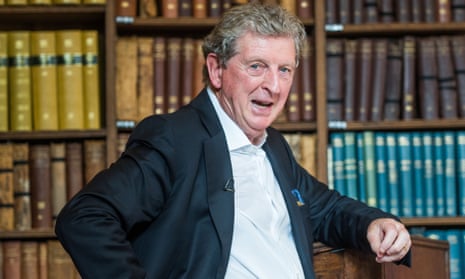Welcome back, then, Roy. And rejoice Croydon, for he has returned. The news that Crystal Palace will turn to Roy Hodgson to replace the departed Frank de Boer is perhaps unsurprising given the background noises of the past few months. For all that there will still be a tendency to roll the eyes, to mock the sudden shift in footballing direction – from the Ajax Way to Purley Way – and to point out that Hodgson is 70 and hasn’t had a club job in five years.
This is undoubtedly a little unfair. In isolation Hodgson to Palace makes plenty of short-term sense. Plus it would be foolish to underestimate Hodgson’s determination to prove a point, his popularity with players and his vast experience. And yet there is no escaping the wider sense of dissonance here. Even in a league defined by its habit of vacillating comically between methodologies and personnel, the lurch from De Boer to Hodgson is one of the more bizarrely abrupt about-turns in Premier League history.
History will now record that the era of Total Croydon, Palace’s attempt to transform the club into an Amsterdam of the A23, lasted exactly 77 days and 450 minutes of competitive football. De Boer had promised his Palace team would “dominate with and without the ball”. Steve Parish had talked quite a bit at De Boer’s unveiling about footballing DNA, a more technical, sustainable Palace style and assorted other things that have now been thrown out of the window in favour of a man from around the corner who knows how to rig up a four-man defence.
It did always seem possible Palace hadn’t read all the small print on De Boer’s connection to the Ajax tradition. One of the great defensive players of his generation, as a coach De Boer has seemed to take most from the Van Gaal end of things, concerned more with control than attacking rhythms. His Ajax teams were invariably the league’s best defenders. Some fans felt the football was stodgy and over-thought.
It is painfully obvious that attempting to impose this imprint on a group of Palace players with just one significant addition from last season would involve a fair amount of thrashing around in the wrong gear. And so it came to pass. Four league games was all it took in the end. But then, for all the fine talk the only revolution any Premier League club is really interested in is one that banks enough points, sharpish, to keep the gravy train rolling.
And so on to Roy. Hodgson was last seen looking frazzled and wired after a sleepless night in Chantilly, sweating and swaying at his lectern and telling the world “I’m not really sure what I’m doing here”, a quote that has since become his “Hit Les”, his multicoloured golfing umbrella. England had lost horribly to Iceland the day before, outplayed by opponents Hodgson had chosen not to scout in person in order to take Ray Lewington on a boat trip down the Seine (“Ray had never seen Paris”).
It was an ignoble end for a good man and a fine, experienced manager, who like so many others found himself bent out of shape by the job in his final few months. And this is the real question when it comes to Hodgson at Palace. Which Roy will they be getting?
It seems clear what the club need now is West Brom Roy, and Fulham Roy before that; the man who successfully implemented his own traditionally English defensive strengths to take Fulham to the Europa League final and West Brom to 10th in the Premier League.

Hodgson has often been cast as an overly rigid manager, perhaps unfairly. But he was also the future once, a manager with a fully implemented footballing revolution of his own on his CV during the hip young gunslinger years at Malmo. Albeit the direct football imprint introduced into Swedish football in the 1980s is rather different to De Boer’s possession-centred Ajax schooling. Either way Hodgson’s best spells in club football have been characterised by well‑drilled defending and simple attacking lines.
And so it was with England, too. Hodgson’s best period with England was arguably his opening five months as a quick-fix replacement for Fabio Capello, when his agreeable manner and agreeably simple demands of the players saw England through Euro 2012 without too many bruises. Oddly his worst moments – the stalled 2014 World Cup, the horrors of the last Euros – came when Hodgson attempted something more. An England built and drilled by old Roy, West Brom Roy would probably have had more chance of seeing off Iceland than the confused, overly funky, ultimately frozen entity fielded in Saint-Etienne and Nice. Wayne Rooney playing in midfield, Harry Kane on corners, the switches between 4-3-3 and 4-2-3-1, the insistence that the suffocatingly dull possession football against Slovakia represented a good performance. It all came a little late. It ended in confusion.
It is to be assumed Hodgson will begin his time at Selhurst Park with a return to the shared traits of Old Roy and indeed Old Palace. The strengths of the past few years – aerial power, wing play – will be dusted off and recalibrated. A good relationship with Andros Townsend will be an advantage. A more mixed-looking relationship with Wilfried Zaha, who made his decision to reject England’s overtures while Hodgson was manager, may be more interesting, although both are grown-ups and in the same camp now. Hodgson will also be desperate to provide a gloss on the late years of his career, to erase the image of that frightening, hollow-eyed farewell appearance last summer.
In the meantime, it is once again farewell to all that: another new dawn curtailed, another half-baked revolution junked. Employing Hodgson makes plenty of sense given Palace’s league position, playing squad and managerial history of the last few years. Employing Hodgson on the back of De Boer’s 77 days, that stalled and, no doubt, commendable attempt to move in another direction, looks like another triumph for short-termism and muddled thought. Palace will have a fight on their hands to get out of trouble in the Premier League whoever is in charge, a self-inflicted state of confusion for which the board must take its share of blame.

